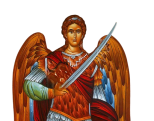
In the name of the Father, and of the Son, and of the Holy Spirit. Amen.
Beloved brothers and sisters in Christ,
Today we join the children of ancient Jerusalem, our hands holding branches, our voices raised in “Hosanna!” As Saint Cyril of Alexandria tells us, “The feast today is both triumphant and terrible, for it leads directly to the voluntary passion of our Lord Jesus Christ.”
Let me share with you a story that might help us understand the deeper meaning of this feast:
In a mountain village in Greece, there lived an old grandmother, Kyria Sophia, known for her deep faith and wisdom. Each year before Palm Sunday, she would gather the village children to teach them how to weave palm crosses. Her small kitchen would fill with the sweet scent of basil and the sound of children’s questions.
One year, her youngest grandson, Nikos, asked, “Yiayia, why does Jesus ride a donkey instead of a horse like a king?”
The grandmother set down her palm branch and spoke words that echoed the teachings of Saint John Chrysostom: “My child, our Lord chose the donkey to fulfill the prophecy of Zechariah, but also to show us something profound about His kingdom. The horse was an animal of war, but the donkey was a beast of peace. Christ came not as a conqueror, but as the Prince of Peace.”
Saint Andrew of Crete beautifully illuminates this moment: “Let us run to accompany Him as He hastens toward His passion… Let us spread before His feet not garments or soulless olive branches, but ourselves, clothed in His grace.”
The next day in church, young Nikos noticed how the light streaming through the windows illuminated the palm branches, creating shadows that looked like crosses on the walls. “Yiayia,” he whispered, “the palms make crosses!”
“Yes,” she replied, “Saint Romanos the Melodist teaches us that even in this triumph, we see the shadow of the Cross. The palms of victory become the palms of martyrdom.”
Saint Gregory Palamas explains that this dual nature of the feast triumph and sacrifice reflects the two natures of Christ Himself. He enters Jerusalem both as King and as Sacrificial Lamb, both receiving worship and preparing for death.
The grandmother would often remind the children that the palm crosses they wove were not mere decorations. “Each fold,” she would say, “is like a prayer. When we make these crosses, we’re learning to weave our own lives into Christ’s victory.”
This wisdom echoes Saint Ephrem the Syrian, who wrote, “Blessed is He who opened His gate to those who offered Him their branches, and through those branches opened His kingdom to the robber on the cross.”
As we stand today with our palms and branches, we must ask ourselves: Do we truly understand what kind of King we welcome? Saint Theodore the Studite challenges us: “Let us not be like the crowd that spreads garments and tree branches before Christ but afterwards stops following Him when the path leads to the Cross.”
The children in our story learned that Palm Sunday contains within it the whole mystery of our salvation. As Saint John of Damascus teaches, “Today’s triumph leads to tomorrow’s passion, yet both reveal the same divine love.”
Let us enter Holy Week with this understanding. Let us spread before Christ not just palm branches but our very lives. As Saint Romanos sings, “Let us receive Him who comes to suffer voluntarily for our sake.”
May we have the wisdom to see beyond the triumph of this day to the sacrifice it heralds, and the grace to follow our Lord not just with songs of “Hosanna,” but with lives dedicated to His service. May we, like the grandmother in our story, teach others through our faith and actions that Christ’s kingship is revealed most perfectly in His voluntary passion.
As we process today with our palms and branches, let us remember the words of Saint Sophronius of Jerusalem: “We too hold branches, not of palm only but of other trees also… Let us therefore offer ourselves to Him, and let us bear Him always in our thoughts, our words, and our deeds.”
Through the prayers of our Holy Fathers, Lord Jesus Christ our God, have mercy on us and save us. Amen.
In the name of the Father, and of the Son, and of the Holy Spirit. Amen.
Copyright © 2025 The Rev. Adrian Augustus. The Russian Orthodox Church of the Archangel Michael, Blacktown, NSW


